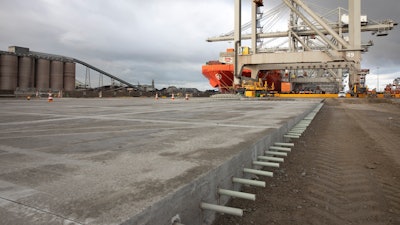Checking out the Advantages of Composites in Building and construction
Checking out the Advantages of Composites in Building and construction
Blog Article
The Role of Recycled Compounds: Enhancing Performance and Sustainability Initiatives
In today's ever-evolving landscape of materials engineering and sustainability initiatives, the usage of recycled composites has become an engaging location of passion. These ingenious materials supply a distinct blend of improved performance abilities and ecological advantages that hold significant assurance for a vast range of markets. By taking advantage of the power of recycled composites, companies can not just elevate their operational effectiveness and product top quality but also add to a more sustainable future. The elaborate interaction between these compounds, efficiency metrics, and sustainability objectives paints a fascinating photo of potential innovations yet to be completely discovered.
Advantages of Recycled Composites
Recycled compounds offer a sustainable solution that not only improves performance but additionally reduces environmental impact in different sectors. One of the vital benefits of using recycled compounds is their capability to draw away waste from garbage dumps. By incorporating materials such as recycled plastics or carbon fiber right into making processes, companies can lower the amount of waste created and advertise a round economy.
Furthermore, recycled composites commonly display similar and even remarkable mechanical residential or commercial properties to virgin products. This indicates that products made from recycled composites can preserve high efficiency criteria while being more eco-friendly. Additionally, making use of recycled composites can aid business satisfy their sustainability goals and reduce their carbon footprint.

Efficiency Benefits of Recycled Composites
Enhancing structural stability and durability, recycled composites provide noteworthy efficiency benefits in various commercial applications. One significant advantage is the boosted strength-to-weight ratio that recycled composites give. This home is specifically vital in industries such as aerospace, vehicle, and building and construction, where lightweight products that maintain high toughness are extremely demanded.

In addition, recycled composites provide superior fatigue resistance compared to many traditional materials - composites. This characteristic is important in markets subject to cyclic loading or dynamic stresses, as it assists avoid early failing and ensures long-lasting dependability
In addition, recycled compounds can be customized to fulfill specific efficiency needs by readjusting the type and proportion of recycled materials utilized in their production process. This personalization capacity allows for the development of high-performance compounds that address the distinct requirements of various sectors, additionally highlighting the performance benefits of recycled compounds.
Environmental Influence of Recycled Composites
The adoption of recycled compounds in different industries has actually prompted a more detailed exam of their ecological impact. In contrast to traditional composites, recycled composites use the benefit of diverting waste from land fills navigate to this site and reducing the requirement for raw materials removal.
Additionally, using recycled compounds can result in a decline in general carbon impact and environmental pollution. By integrating recycled products right into brand-new composite products, companies can add to source preservation and waste reduction initiatives. Additionally, the sturdiness and long life of recycled composites can prolong item life expectancy, more minimizing environmental impact. In spite of these advantages, obstacles such as maintaining worldly quality and making sure correct reusing facilities exist. Continued research study and development in this field are necessary to maximize the environmental efficiency of recycled compounds and advancement lasting methods across sectors.
Applications of Recycled Composites
Different industries have embraced the application of recycled compounds as a result of their versatility and performance-enhancing buildings. One of the vital applications of recycled composites remains in the vehicle industry, where they are used to manufacture light-weight parts such as bumpers, indoor panels, and under-the-hood parts. These compounds help minimize the total weight of automobiles, enhancing fuel efficiency and minimizing carbon emissions.
In the building market, recycled composites are progressively being used to produce durable and weather-resistant building materials. These materials supply high strength-to-weight proportions, making them excellent for applications such as roof, cladding, and decking. In addition, making use of recycled compounds in infrastructure projects, such as passages and bridges, has actually acquired grip due to their long life and resistance to rust.
In addition, the aerospace market relies on recycled compounds to produce airplane parts that require high strength a fantastic read and tightness. These compounds play a vital function in boosting the efficiency and gas performance of airplane while decreasing upkeep costs. In general, the diverse applications of recycled composites across industries highlight their considerable contribution to boosting sustainability efforts and improving efficiency requirements.
Future Expectation for Recycled Composites
With a boosting concentrate on sustainability and development, the future expectation for recycled compounds in different industries appears appealing. As firms aim to meet environmental goals and decrease their carbon impact, the need for lasting materials like recycled compounds is expected to climb significantly. Industries such as automobile, aerospace, building and construction, and consumer items are increasingly transforming to recycled composites due to their lightweight, sturdy, and eco-friendly homes.
In the vehicle sector, making use of recycled composites in lorry manufacturing is forecasted to increase as car manufacturers look for to create lighter and more fuel-efficient automobiles. Likewise, in the building and construction industry, there is a this growing rate of interest in making use of recycled composites for facilities tasks to minimize waste and enhance sustainability. The aerospace industry is also exploring the capacity of recycled composites for airplane elements to boost gas effectiveness and lower discharges.
Verdict
In conclusion, recycled composites offer various advantages in regards to performance and sustainability. They offer improved strength and sturdiness contrasted to conventional products, while additionally reducing ecological impact by reusing waste products. The applications of recycled compounds are large, ranging from construction to vehicle sectors. Moving on, using recycled compounds is expected to continue to grow as industries and business prioritize sustainability initiatives in their operations.
In today's ever-evolving landscape of materials engineering and sustainability campaigns, the usage of recycled compounds has actually emerged as a compelling area of interest. In comparison to traditional composites, recycled compounds supply the benefit of drawing away waste from landfills and decreasing the requirement for raw materials extraction. By incorporating recycled products into brand-new composite products, companies can contribute to source conservation and waste decrease efforts.In the construction field, recycled composites are significantly being made use of to produce weather-resistant and long lasting structure products. As business strive to satisfy ecological objectives and reduce their carbon footprint, the demand for sustainable materials like recycled compounds is expected to rise dramatically.
Report this page